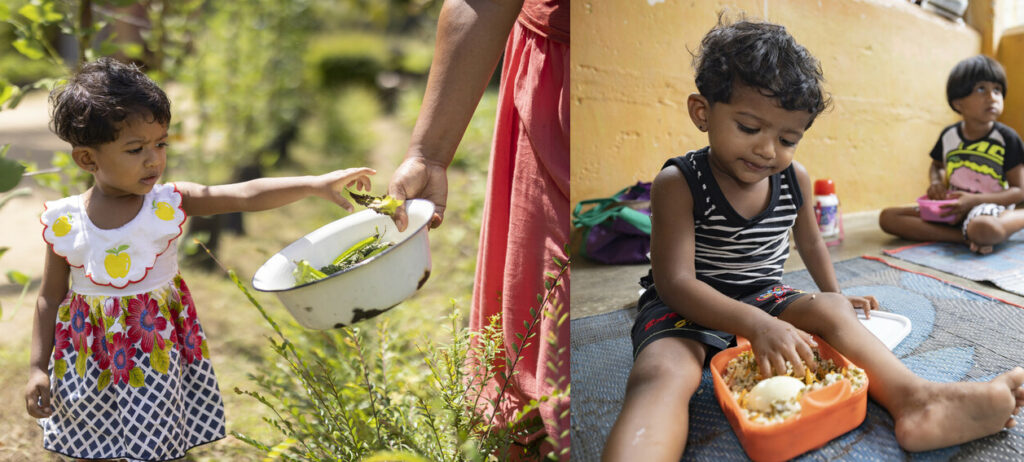Story of Shenu

Nilanti (37) lives with her husband, five children and in-laws in a small village in Monaragala District, Sri Lanka. Theirs is a large house made of homemade bricks and iron sheets and sandwiched between vast rice paddies, which now lay fallow. The economic crisis that has unfolded in this island nation in Asia has brought many things to a halt, including most of the family’s rice farming. “Normally we harvest 20 bags of rice each year, but this year we got just three,” says Mum. Whereas drought is the culprit for such a poor harvest in many places in the world today, on Nilanti’s farm –
and countless others throughout the country – it’s the severe shortage of fuel and fertilisers that has resulted in a devastated livelihood for the family and a near-complete loss of income for an entire year.
It is in this setting that Nilanti’s youngest child, Shenu, now 2 years old, began her second year of life and started to eat solid food. Since that time, Shenu’s growth rate and nutritional outlook have remained poor, charting in the orange “needs improvement” section indicating moderate acute malnutrition. “Before this crisis, we used to be able to afford eggs and meat, but now we’re lucky if we can afford these things once a month,” says Mum. Consequently, once Shenu began to eat solid food her meals consisted mainly of fried rice with a tomato and onion sauce. “I would try my best to
give Shenu what she likes so she would eat. It just wasn’t the right things. It wasn’t the healthiest.” Shenu’s poor growth chart reflected in her physical health as well. She was sick much of the time with fevers, colds and congestion.
With a daunting number of children in a similar situation as Shenu, five months ago, ChildFund began to respond to the crisis in her village by opening a community kitchen as part of the Community Response Hubs project. Here, lead mothers and volunteers cook a large, healthy and well-balanced meal three times a week, with the mothers and volunteers supplying the labour while ChildFund supplied the food and equipment. Young children up to age 5 can come and receive a meal here three times a week. Other children and family members are also served if food supplies are adequate.
“The food at the community kitchen is more appealing to kids,” says Mum. “They like to eat it. [Shenu] eats with other children her age, and the group aspect encourages them all to eat well.” Animal protein like meat or eggs, or superfoods like moringa leaf, are served here, along with a vegetable curry. As a participant in the programme, Nilanti also cooks at the kitchen as a volunteer once a week, serving her neighbours while gaining valuable knowledge from a lead mother on how to cook healthy food at home. “I don’t know where we’d get our meals from if this weren’t here,” says Mum, referring to the community kitchen. “It is a pillar of strength for our community.” With the family’s vast rice fields unable to be farmed on the scale they used to be, ChildFund helped Shenu’s family establish a more manageable garden, one that could be enriched with manure rather than industrial fertiliser. ChildFund also provided seeds, equipment and training to the family. Today they grow a rich variety of fruits and vegetables at home including tomato, bitter gourd, beans, radish, chilies, leafy greens, peanuts and papaya. Nilanti is even starting to earn a bit of income with the extra harvest she’s getting. “Just yesterday I sold a gourd for 400 rupees ($1.16),” she says. These days Shenu is eating a better quantity and variety of food than she ever has, and it’s starting to show on her chart. “I used to get scolded in front of all the other mothers,” Mum says, talking about her experience in bringing Shenu to growth monitoring sessions. “But the last time I brought her, she charted in the green! I felt so happy. It was just yesterday she was weighed in and showed an increase of 600 grams (over 1 pound) in just a month. I was overjoyed!”

